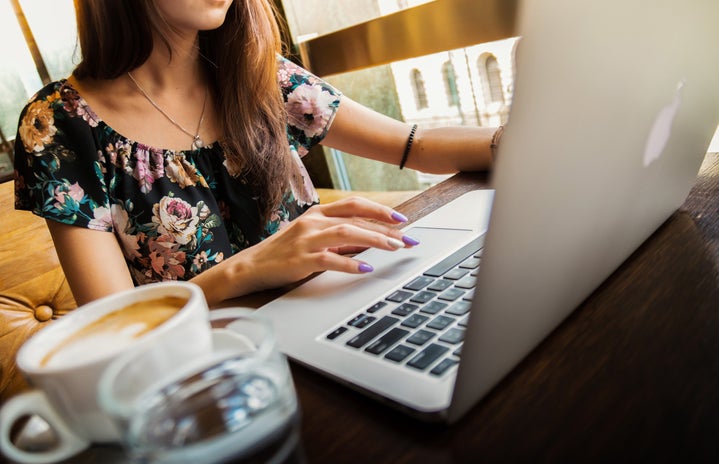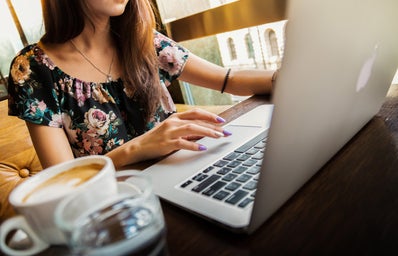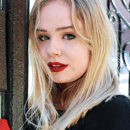I am queer. I have known this to varying degrees since I was a preteen. Most of my young celebrity crushes were on pretty girly dudes, like Adam Lambert and (for some reason) Pete Burns from the 80s band Dead or Alive. In junior high I fantasized about singing “Just the Way You Are” by Bruno Mars at the school talent show, and dedicating it to a friend of mine, who (surprise) was actually a girl–but this wasn’t the only sign. Returning to my preteen days of sexual uncertainty, when I purchased the Sara Bareilles album “Kaleidoscope Heart”, which happens to feature album art of Bareilles in menswear—a suit, tie, and fedora—a 12-year-old me was consumed by the cover art, thinking soft thoughts of the songstress with her big nose and dainty neck and passionate brown eyes. Now, eight years later, I’m dating a wonderful girl with a similiar big nose, and a dainty neck, and passionate green eyes (because sometimes the universe does work in mysterious ways). Though I am happier than ever, my queer journey was not a linear one. In fact, dating my current girlfriend was the only thing that could fully convince me that I liked women.
this is Pete Burns, who I was extremely attracted to as a preteen in 2010. I am not joking.
With that, my understanding of my queerness was haunted with thoughts that I was faking it. That I was just another silly girl claiming the title of bisexual for attention. I’m unsure where, exactly, these fears stemmed from. But if I had attribute it to anything, I would place this burden upon the shoulders of the barrage of straight women faking being gay for attention. Regardless of the problem’s root, I was more afraid of being part of some hypothetical problem than I was of actually being queer. I had only dated men, most of my huge crushes had been on men, and it was difficult for me to even wrap my mind around the idea of kissing a girl. When a girl took me on a date, bought me a very nice dinner and took me to get her favorite chai in town, and then kissed me in her car on a hill facing the lights of the city, I felt nothing but regret for leading her on. I thought that was that—I was not into woman. That what I was, was a fraud.
In retrospect, it’s totally wild that I was so convinced that I wasn’t romantically or sexually attracted to women. (I mean, I listened to a lot of Tegan and Sara as a preteen.) I now know that this misguidance came from a place of a lot of self-resentment, confusion, and denial. It isn’t as though I was homophobic and didn’t want to be queer. I wanted so badly to be queer, but I didn’t know what that would look like, or how it would work. But now, as I get older, I feel like everyone is coming out. Friends from high school I would have never guessed loved anything other than a good dicking down, are showing up with girlfriends. And that’s what it is: they were once scared and confused too, like me. But they all love women and are slowly finding the words for it, like me.
My best friend, Hope, is probably queer. I can’t put my finger on it, but I’ve always suspected it. Call it gaydar or call it intuition, but I had a good hunch. Now, as she watches me in a wonderful, passionate, queer relationship (humble brag), she brings it up slowly. “I think I have a crush on this girl at school,” or she’ll talk about being attracted to a drag queen in and out of drag, with confusion and exasperation and delight in her voice and eyes. She’ll show me the Instagram of a girl she thinks she might be attracted to. We talk about it, and she always peppers the conversation with one sentence: “I don’t know.” or, better yet, “I think I might be faking it.”
But I don’t blame her. Unfortunately, we all get our ideas of what romance looks like from the media we consume and the people around us. (and the lack of queer representation, in turn, has deadly costs). Most of us have never seen open queer relationships. Maybe a family member has a same-sex partner, or maybe we watched a show that had a queer couple. Not surprisingly, then, our notions of how to love often comes from our heterosexual parents, from our heterosexual peers, and from the heteronormative media we watch. And because there is a shortage of queer love to learn from, we don’t know how to handle our queer attraction. We try to mold it after heterosexual attraction, like a kid fitting a circle in a square hole on one of those shapey-toys. (I don’t know what they’re called, but they’re the best metaphor, so be patient with me, thanks.) I day dreamed about singing to a girl in front of the whole junior high school because I saw boys doing it. I imagined Adam Lambert falling for me because he was the closest thing to a soft woman I found in the media around me that was still acceptable, because he was, at the end of the day, still a handsome man, and just queer enough to satiate my curiosity.
In consideration of the media shortage of queer relationships, of course my friend struggles with looking herself in the mirror and understanding she is a queer woman. Any queer women she’s seen in media haven’t looked like her, haven’t been images she can identify with. And she’s never seen queer love treated with the same reverence that heterosexual love is treated with in every rom-com, every fairy tale, every piece of narrative media she’s known. And so it’s really, really hard to accept it within herself. There’s never been a roadmap for queer women the same way there is for heterosexual women, and so it’s hard to know within ourselves.
Hope is the best person I know. She’s hilarious, endlessly compassionate, and so good-hearted. We talk a lot about the feeling of not being understood, of facing down a world that doesn’t know what to do with our weirdness. I’m walking down a road of seeing how my queerness contributes to my otherness, and finding community and guidance in that. I hope so badly that she, and every other queer woman who hasn’t figured it out for herself, can find herself and her queerness, and be happy in it. But I don’t just hope that, I know that she will. I believe, maybe short-sightedly, maybe optimistically, that we’re figuring our shit out. Queer representation in media is better than it’s ever beter, and it t can only get better. I wish that when I was young and into girls but confused about it that I had had shows like She-Ra or Queer Eye or Brooklyn-99 that featured openly queer people/characters and showed them happy. It makes a world of a difference to see people that are like you, and to see them happy. I hope you see people like you, and I hope you get to see them be happy.



